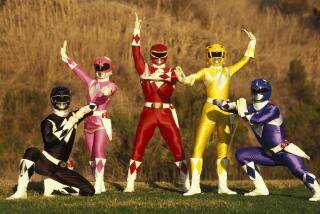Silver Memories and Bullets
- Share via
Funny how the images and phrases of long ago can thrive so vividly in aging memories that stumble now over new ATM passwords. A fiery horse with the speed of light.... A faithful Indian companion.... Return with us now to those thrilling days of yesteryear, the Lone Ranger rides again.
Ninety years ago this week, Jack Carlton Moore (later Clayton Moore) was born in Chicago and dreamed of becoming a trapeze artist. Fifty-five years ago this week, a masked Moore, who gave up trapeze work for movie stunts, rode onto tiny Dumont television screens to bring sure-handed justice to the American West and show many of us what right’s triumph over wrong meant. At its best, nostalgia provides a contemporary milepost, like marking children’s heights with a pencil on the door jamb, to measure change over the years.
The incorruptible Lone Ranger rode into America’s Depression-era psyche as a radio show on Detroit’s WXYZ. He didn’t have a job either. As the sole survivor of a Texas Rangers posse ambushed by the fiendish Butch Cavendish gang, the Ranger and his rescuer, Tonto, appointed themselves good guys, frontier detectives who helped regular citizens right the wrongs of larger forces. In the process they never killed anyone -- no exploding heads either -- and seemed less inclined to fire silver bullets than leave them as silent souvenirs. (The bullets, by the way, came from a secret mine and account for the white horse’s name.)
As the Mutual Radio Network found huge success with 2,956 Ranger episodes, so, in 1949, did the fledgling ABC television network with Ranger stories on wild western lands remarkably resembling the Chatsworth area. For those “graduating” from the radio version, grainy movies on black-and-white screens seemed pedestrian after radio’s evocative sounds and adventures limited only by a listener’s vivid imagination.
Either place, the dutiful duo always got its man. The Ranger’s shirt never got wrinkled. And rescued families were always appreciative, if puzzled, by a noble stranger. Clayton Moore stood tall in his fancy saddle and the frontier’s pioneer pantheon. He died in 1999, having said that he was a better real-life human for having been the fictitious Lone Ranger. The show’s theme music (Rossini’s “William Tell Overture”) and many of its signature details -- the silver bullet, Kemo Sabe, Hi-yo Silver away! -- endure as American idioms. Maybe someday Americans will discern an answer to that question with the legendary resonance, “Who was that masked man?” He was what we could be.
More to Read
The complete guide to home viewing
Get Screen Gab for everything about the TV shows and streaming movies everyone’s talking about.
You may occasionally receive promotional content from the Los Angeles Times.






